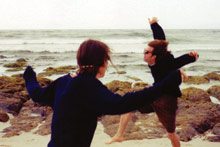All the ingredients for a tragedy were in place. Jason Crigler, a popular and talented young guitarist in New York City, rushes offstage during a set to his pregnant wife backstage. They leave in an ambulance. At the hospital, doctors report his brain is bleeding—he may die, or live as a vegetable. He gets better, then worse. His muscles seize. Months pass, he improves, then suffers another setback. Doctors say he won’t recover, so his Medicaid stops. Put him in a nursing home, the doctors say.

But here’s the twist. His family, in the words of his father, “goes far beyond hope,” and never gives up the belief he will get better. They work continually to draw him out of his void. Instead of a nursing home, Jason moves into an apartment with his wife and new baby. Thanks to an amazing amount of dedication and support, he recovers. Next Wednesday, he will be visiting Asheville for a showing of Life.Support.Music.—a documentary chronicling his story.
Proceeds from the Asheville screening will benefit the Asheville chapter of the Brain Injury Association of North Carolina, which provides free services to survivors. Karen Harrington, coordinator of the Asheville Family Support Center, hopes the film brings about awareness for brain injury.
“Basically, what most survivors want is what anyone else wants, which is to be productive, to do something they feel good about, be accepted for who they are, and to have inclusion within a community,” Harrington says.
“It’s amazing to see the impact it’s had,” Crigler says from his Cambridge, Mass., home. “People everywhere seem to be really moved by the story.”
The positive effect his story has on others helps him deal with the loss of more than 18 months of his life, which includes missing the birth of his daughter Ellie, now 3 1/2.
Life.Support.Music. was made by the award-winning, Brooklyn-based filmmaker Eric Metzgar. Metzgar and Crigler are friends who collaborated musically in the past, and Crigler’s family asked Metzgar to shoot the documentary. In addition to Metzgar’s original footage, the film incorporates home movies and footage the hospital staff shot for training purposes.
The film’s pace illustrates a striking contrast between where Crigler was, and where he is now. “I really like to give people time to think about the film while the film is playing,” Metzgar says. “There is this breaking point if you leave a shot on long enough that someone’s attention span—or rather short attention span—sort of dissolves and the actual content of the film starts to sink in.”
Crigler is still recovering. He wears splints on his hands at night, does exercises every day, takes medication, and sees doctors and specialists regularly. Playing the guitar again requires a lot of effort, but he is not as critical of his talent as he was before the accident.
Jason Crigler in Asheville and beyond
Check out Crigler’s music at www.jasoncriglermusic.com.
The day of the Asheville screening Crigler will be interviewed at 11 a.m. on 98.1 FM The River. NPR’s All Things Considered is set to interview Crigler in December and Life.Support.Music. will show on PBS next summer.
what: Screening of documentary Life.Support.Music.
where: Fine Arts Theatre
when: Wednesday, Dec. 10. 7 p.m. ($10. Reception beforehand at Martha Nell’s. Cost for reception and movie is $25. Crigler and his father will take questions after the movie. For details, contact Debbie Lampton at 250-0082 or Karen Harrington at 277-4648. www.lifesupportmusic.org)
“I derive so much more satisfaction from writing, playing and singing than I did,” he says. He’s also able to perform and works from his home making music for film and advertisements.
Life.Support.Music. is an intimate examination of the subjects’ lives. “I think it’s part of the reason that the film is so powerful, but it’s a little like somebody is reading your journal,” Crigler says. “But, any uncomfortableness about [such a candid portrayal] is quickly cancelled by how much good I’ve seen come of this.”
Aside from film festivals, the film played at Spaulding Rehabilitation Hospital in Boston, where Crigler spent time. The showing was packed with patients and their families. Afterward, Crigler recalls, an Iraq war veteran who had a serious brain injury and lost both of his legs “came up to me in tears, and was just thanking me and saying, ‘This film has just given me so much hope.’”
[Liz Allen is an Emma-based freelance writer.]



Before you comment
The comments section is here to provide a platform for civil dialogue on the issues we face together as a local community. Xpress is committed to offering this platform for all voices, but when the tone of the discussion gets nasty or strays off topic, we believe many people choose not to participate. Xpress editors are determined to moderate comments to ensure a constructive interchange is maintained. All comments judged not to be in keeping with the spirit of civil discourse will be removed and repeat violators will be banned. See here for our terms of service. Thank you for being part of this effort to promote respectful discussion.